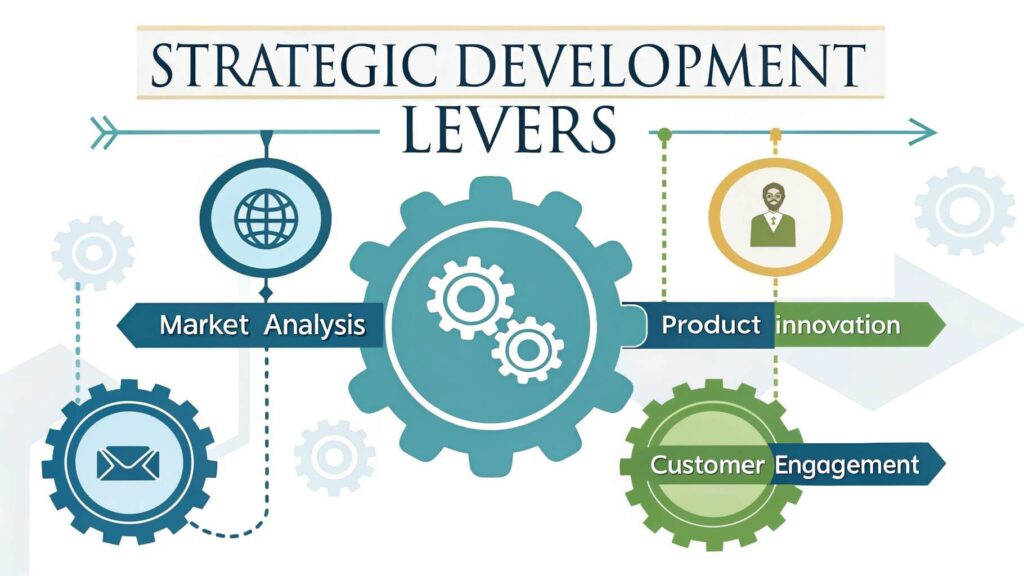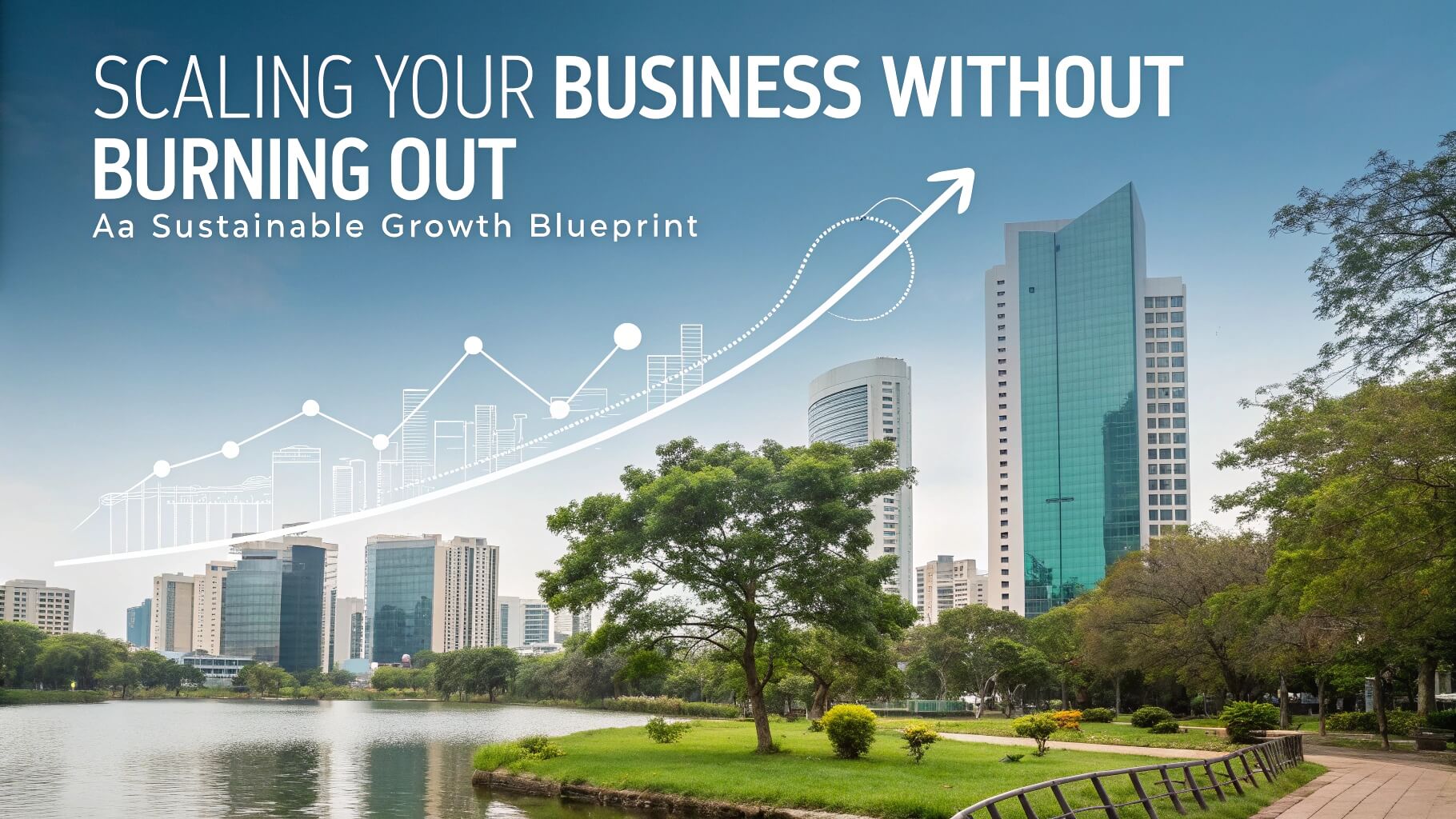Your company is hitting its targets. You have put in the hard yards, negotiated the ups and downs, and now development is clearly within reach. Indeed, these are interesting times. Indeed! Burnout is a less glamorous side effect that lurks, though, amid the excitement of progress. Starting a business can be an exhilarating experience, yet a single poor decision can wipe you out. The pressure grows, the to-do list gets unbounded, and suddenly the passion that began it all seems buried under simple tiredness.
Sounds familiar? You are not alone. Many businesses run against this wall and discover that the very success they yearn for is stretching them. But what if scaling meant not compromising your sanity, health, or relationships? Suppose you could create momentum sustainably. Today, we are exploring a roadmap for growing your company without sacrificing yourself in the process. Burnout is not what we want here. Let us now get right into it.
Appreciating the Burnout Trap and the Scaling Challenge
Scaling is about essentially changing how your company runs, not only about doing more of the same. Often, as development accelerates, foundations begin to show signs of weakness.
- Systems that suited a smaller operation begin to buckle.
- Your team may feel overburdened.
- Communication may fall apart.
- You, the owner, usually find yourself working longer than ever and wearing far too many hats.
The Aussie business scene is competitive, and success is very much driven. Though strong, this ambition can readily turn into hyperbole. We tell ourselves we just have to get through this next phase, work a little more, and give up a little more sleep. This “hustle culture,” though, is unsustainable. Pushing nonstop results directly in burnout, that condition of constant physical and mental tiredness. It affects your health, decision-making, creativity, and finally—the company you have so carefully developed. Growing smarter, not only harder, is what sustainable scaling entails.
Creating a strong basis for expansion

You really want to make sure your company has a strong basis before you start accelerating. Imagine it as building a house: you wouldn’t add a second story without first considering structural integrity. In business terms, what does this look like?
Vision and Mission Clarity
- First, once more, obvious your vision and mission.
- Could you please clarify the reasons for scaling?
- Beyond only higher income figures, what defines success?
- Getting back in touch with your “why” gives you direction and filters chances.
- Could you please confirm if your long-term objectives align with this expansion?
Financial Stability
- Then start to control your finances. Stable development calls for strong financial stability.
- This entails thoroughly understanding your cash flow, exercising meticulous control over your expenses, and generating precise financial forecasts.
- Are your models of pricing scalable?
- If you need funding, do you have access to it?
- Track not only income but also profitability closely. The engine driving steady growth is healthy profit margins.
Key Performance Indicators (KPIs)
- At last, specify your Key Performance Indicators (KPIs). Revenue is crucial, but it’s not the only statistic that counts.
- Think through KPIs in customer satisfaction, team morale, operational effectiveness, and market share.
- Monitoring a balanced set of indicators guarantees you’re not just chasing empty growth and offers a whole picture of the state of affairs in your company.
Systemized, Systemized, Systemized!
The challenging truth is that, should the company rely just on you, you cannot scale successfully. Systems are the scaffolding supporting development, allowing consistency and efficiency and freeing you to work on the business—not just in it. Remember, systems create freedom, even if the thought of documenting procedures makes you cringe.
Documenting Processes
- Starting with sales, marketing, operations, administration, and customer service, find recurring tasks all around your company.
- Record how these chores are completed to produce Standard Operating Procedures (SOPs).
- These don’t have to be large, sophisticated papers; often enough, straightforward checklists or process maps are enough. The intention is to establish a repeatable process of operation that everyone on your team can follow.
Leveraging Technology
- Take advantage of technology. Software available today can probably automate or streamline almost any business process.
- Explore:
- Customer relationship management (CRM) systems to handle leads and customer interactions.
- Project management tools to track tasks and deadlines.
- Accounting software to handle finances.
- Marketing automation tools to nurture prospects.
- By boosting efficiency and lowering hand-off responsibility, investing in the correct tech stack pays off. Systems ensure quality and consistency even as your volume increases.
The Power of People: Team Development and Delegation
Scaling is essentially a team sports activity. Attempting to handle everything yourself can lead to burnout. Non-negotiables for sustainable development include developing a capable, empowered team and learning to delegate properly.
Hiring and Culture
- Priority one is selecting the correct staff. Search for people who not only possess the abilities but also fit your values and corporate culture.
- Maintaining a good and encouraging culture becomes especially more important as you develop. It raises retention and morale and draws talent.
- Spend time correctly introducing new team members so they grasp their roles and the vision of the business.
The Art of Delegation
- The art of delegation then follows. For founders used to having their hands in everything, this is sometimes a big challenge.
- Though it seems dangerous, letting go is absolutely vital.
- Start small, precisely specify the work and intended result, provide the required tools and authority, and then rely on your staff to deliver.
- Fight the temptation to micromanage.
- Good delegation is empowering your team members to develop and take responsibility, not only assigning chores.
- Here, developing strong leadership skills is crucial; occasionally, business coaching can offer founders useful tools and frameworks to enable them to become better team leaders and delegates, thereby creating an environment where everyone can flourish. Recall that funding the growth of your team is funding the future capability of your company.
Strategic Development Levers

Scaling goes beyond just increasing the demand for your current product by means of more customers. There are several strategic levers you can pull to achieve development without necessarily matching your workload proportionally.
- Consider strategic cooperation. Working with complementary companies can create joint offers, open new client bases, or provide access to fresh resources. Could you identify other providers offering non-competitive services for your target market? Could you cooperate for both of your advantages?
- Exercises market expansion with excellent care. This could mean looking at foreign markets if suitable or perhaps focusing on fresh geographical areas within Australia. First, conduct extensive market research. What works in Sydney may need adjustment for Perth or Brisbane.
- Please organise your marketing and sales channels. Does a bottleneck exist? Can you increase conversion rates at any level? Often, leveraging specialized AI SEO partners to refine your search strategy can result in notable improvements in lead quality without adding more tasks to your personal to-do list. Emphasise customer lifetime value and retention; typically, it is more affordable to keep an existing customer satisfied than to attract one from scratch.
- Think about diversification of goods or services. Could you add complementary products to value your current clientele more? Maybe create tiered service tiers? Diversification can strengthen customer relationships and generate fresh income sources, thereby supporting more steady growth.
Protecting Your Health: The ‘Sustainable’ Component
This brings us back to earth. Neglecting your own well-being will cause burnout, regardless of all the techniques, systems, and team-building programmes. Sustainable development calls for a sustainable leader. You must deliberately create habits safeguarding your health and vitality.
- Establish limits. Although often challenging, setting limits is absolutely vital. Clearly set and follow your working hours as much as you can. Learn to decline requests or opportunities that overburden you or conflict with your strategic priorities. Protect your personal time; it is not a luxury; perspective and recovery depend on it.
- Give your physical condition top priority. Though these are basic needs, it’s easy to let sleep, healthy eating, and exercise slide under pressure. See them as body and brain performance enhancers. Consider scheduling your exercise with the same importance as any other significant meeting. Store nutritious snacks in your bag. Try sleeping consistently. Little changes add up to something.
- Plan leisure time activities and downtime. You need activities outside of the office to revitalise you. Make time for activities you enjoy—spending time with friends and relatives, following a hobby, getting outside in nature, or just reading a book—that will help you relax and separate you from demands at work.
- Ask for help. You need not negotiate the difficulties of scaling alone. Create a strong support system comprising industry groups, peer groups, and mentors. Talking to people who know the demands can offer priceless viewpoints and guidance. Ask for help without thinking twice from your team, consultants, or even a therapist or coach.
- At last, acknowledge the victories! Celebrate both major and minor achievements. Acknowledge the work of your staff and yourself. Spending time to recognise advancement inspires you and helps you to remember why you started on this road in the first place.
Completing Your Sustainable Scaling Path
Scaling your company is quite wonderful, friend. It speaks much about your vision and diligence. But your well-being shouldn’t suffer to reach progress. Emphasising a strong foundation, solid systems, an empowered team, strategic development levers, and, most importantly, your own self-care will help you create a business that thrives and expands steadily.
It’s about working smarter, building resilience, and running a company that supports your life, not consumes it; it’s not about avoiding hard work. While it may not be a panacea, this blueprint provides a framework for managing the thrilling and challenging journey of growth without succumbing to burnout.
When scaling, what are your toughest obstacles? Alternatively, maybe you have great advice for keeping equilibrium during development stages? Comments below allow you to share your ideas; let’s grow together!




